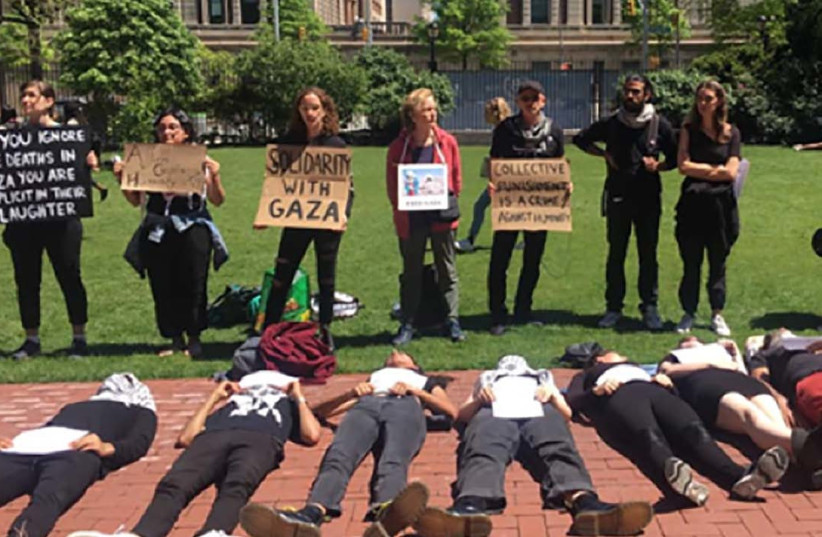A recent survey by the Louis D. Brandeis Center for Human Rights Under Law revealed that over 70% of Jewish college students in the United States have personally experienced or were familiar with an antisemitic attack in the past 120 days. As well, the AMCHA Initiative, an organization that documents antisemitism on college and university campuses across the United States, reported an astounding 761 incidents in 2021. Antisemitism is manifested in subtle and overt ways, including the marginalization of Jewish voices in college journalism. Jewish students are now finding increasing difficulty in sharing their perspectives on campus due to constant discriminatory behavior from editors of college campus newspapers.
Concerned by these findings, I interviewed two Jewish students with firsthand experience with the rise in campus antisemitism: Aidan Segal, a senior majoring in English with a certificate in Jewish Studies at the University of Pittsburgh, and Matthew Blicher, a third-year politics, philosophy, and economics major at Northeastern University.
Segal has contributed over twenty articles to his campus paper, and local and national outlets in the last three years. In late 2020, Segal wrote an article addressing Holocaust trivialization. Aidan postulated that Holocaust comparisons are ill-considered and often cross into antisemitism. Furthermore, Aidan’s article addressed significant campus issues: that Israel’s most vocal critics casually compare Zionism to Nazism.
Despite presenting a well-researched article with solid argumentation, editors at Pitt News prolonged and complicated the editing process for Aidan’s article. After nearly six weeks of deliberation and countless edits, Segal requested a Zoom call with the editors and the adviser of the newspaper with the hope that he would address their concerns.

Once in the meeting, one of the editors admitted that she didn’t want to publish his article because it defined Zionism as the Jewish right to self-determination in their indigenous homeland, a claim she personally disagreed with.
Both editors at the time were Jewish. “I think the most difficulty I’ve had is with fellow Jewish students,” Segal said. “You have people who are kind of given an ultimatum: you can choose between your Jewish identity and [or] your passion for progressive politics, with many choosing the latter.”
Understanding the editors at Pitt News would not allow him to publish the article with his opinions intact, Segal made the difficult choice to leave the paper. This was a dispiriting outcome.
Not willing to throw in the towel, Segal exclusively turned to larger, more respectable outlets to publish his articles. He joked, “When Jews were denied membership at the country clubs, in protest… [They] just built better country clubs.” Since then, Segal’s work has been featured in The Algemeiner, the Jewish News Syndicate, and the Pittsburgh Post-Gazette.
Blicher has also faced his share of challenges at Northeastern University.
During the spring 2021 term, Blicher wrote a response to an opinion piece published in The Huntington News. Blicher’s article addressed several falsehoods, namely the authors’ casual defense of the bigoted Boycott, Divestment, and Sanctions (BDS) campaign and support for the Students for Justice in Palestine chapter at Northeastern University, a student group with a history of promoting hate on campus.
While the editors at The Huntington News acknowledged Blicher’s submission promptly after receiving it, they began to heavily scrutinize the pro-Israel content in his article. After three months and dozens of edits, the editor-in-chief decided against publishing Blicher’s article, stating that ,while they appreciated Blicher’s hard work, it didn’t seem fitting for their publication. In comparison, The Huntington News published a second anti-Israel article a mere week after the first article that Blicher attempted to respond to. Zionist students like Blicher face hurdles that most students, and anti-Zionist students specifically, do not when sharing their views.
The challenges faced by Segal and Blicher are hardly isolated incidents. It is disconcerting that academic departments, campus papers, and student groups across North America are willfully legitimizing Jew-hatred and compromising on intellectual diversity. In the last academic year, the NYU Review of Law and Social Change adopted a sweeping academic boycott that would, in practice, end ties with Israeli institutions and censor perspectives that challenge the litany of falsehoods and antisemitism spread by organizers of BDS.
While the challenges might seem insurmountable at times, Segal and Blicher show no signs of backing down. They are committed to Zionism. “I hold Zionism to be the natural next step in the history of the Jewish people. In order to defeat global antisemitism, the Jewish people need to have self-determination and their own country….Israel is the only place in the world that we can call home. It retains the heartbeat of our people,” said Segal. “Israel is a country objectively founded on the ideas of democracy and Jewish values… [and] somebody needs to publish the truth,” he added.
It is unreasonable to expect Jewish students to check their support for Israel at the door. I call upon my fellow Jewish students to speak out when they experience bigotry and hold their university administrators, student governments and campus outlets accountable, in order to turn the tide against antisemitism. “Causing a stir is how we solve these problems; we need to show people what’s happening,” said Segal.
The writer is a 2021-22 CAMERA on-campus fellow at the Hebrew University, who made aliyah in 2019 from New York. The Committee for Accuracy in Middle East Reporting and Analysis provides education and combats inaccurate information about Israel in the media and on college campuses.
